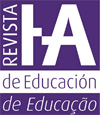La actividad científica y la génesis del conocimiento científico en los textos escolares de ciencias naturales. Un análisis de clasificación
DOI:
https://doi.org/10.35362/rie3516391Palabras clave:
contextos de la actividad científica, génesis del conocimiento científico, análisis factorial de correspondencias múltiplesResumen
La enseñanza sobre la ciencia en el contexto escolar centrada en la referencia casi exclusiva a un sacrosanto método científico, omite una presentación de la actividad científica que enfatice las condiciones del nacimiento de las teorías científicas, las preguntas que los científicos intentaron responderse en su contexto histórico y las funciones para las cuales fueron creados los conceptos. La descontextualización histórica y la pérdida del carácter inherentemente humano de la actividad científica son dos consecuencias de tal presentación. La Reforma Educativa impulsada en la Provincia de Buenos Aires, República Argentina, enfatiza, reiteradamente en sus documentos curriculares, sobre el rol de importancia que la Historia de la Ciencia debe tener en la construcción de un adecuado entendimiento sobre la naturaleza de la ciencia en el alumno. El presente trabajo pretende exponer y analizar los resultados obtenidos en un análisis de clasificación elaborado a partir de las visiones sobre la génesis del conocimiento científico que son presentadas en los textos escolares.
Descargas
Citas
ABDULLATEEF, H.H.: ”Emirates pre-service and in-service Teachers´views about the Nature of Science”, International of Journal of Science Education, Vol. 21 (No 8), pp.807-822. (1999) DOI: https://doi.org/10.1080/095006999290309
ABIMBOLA, I. O.;: “The Relevance of “New” Philosophy of Science for the Science Curriculum”; School Science and mathematics; Vol 83 (3), March. (1983) DOI: https://doi.org/10.1111/j.1949-8594.1983.tb15510.x
AIKENHEAD, G.S.: “Collective Decision Making in The Social Context of Science”, Science Education 69 (4): 453-475. (1985). DOI: https://doi.org/10.1002/sce.3730690403
AIKENHEAD, G.S. and Ryan, A.G. (a): “The Development of a New Instrument: “Views on” Science-Technology-Society” (VOSTS)”, Science Education 76 (5): 477-491. (1992) DOI: https://doi.org/10.1002/sce.3730760503
AIKENHEAD, G.S. and RYAN, A.G. (b): “Students´ Preconceptions about The Epistemology of Science”, Science Education 76 (6): 559-580. (1992)
BARKER, S. F.: “Inducción e Hipótesis. Estudio sobre la lógica de la confirmación”; Buenos Aires, Eudeba, (1963); Título original: “Induction and Hipótesis. A study of the Logic of Confirmation”; University Press, New York, (1957).
DOCUMENTO CURRIRCULAR Dirección general de cultura y educación. Consejo General de Cultura y Educación. Provincia de Buenos Aires. (1996).
PROGRAMA IDENTIDAD CONOCIMIENTO Y CONVIVENCIA Proyecto fortalecimiento de la Gestión Curricular del Plan Provincial de Formación Continua Docente 4458/00. Dirección general de cultura y educación. (2000),..
CHALMERS, F. A.: “¿Qué es esa cosa llamada ciencia?”. Quinta edición, Siglo XXI Editores, (1987). Título original “¿What is this thing called science?”, University of Queensland Press (1ra. Ed. 1976), Traducción al castellano de Eulalia Pérez Sedeño y Pilar López Mañez.
DUSCHL, R. A.;: “Renovar la enseñanza de las ciencias. Importancia de las teorías y su desarrollo”; Narcea, S. A. de Ediciones, Madrid, (1997). Título original: “Reestructuring Science Education. The importance of Theories and Their Development”. Traducción: Ana Ma Rubio.
FLEER, M.: “Children’s alternative views: alternative to what?”; International Journal Science Education, Vol 21, No 2, pp. 119-135. (1999) DOI: https://doi.org/10.1080/095006999290741
HEMPEL, C.: “Filosofía de la Ciencia Natural”; Alianza, Madrid. (1979). Versión española de Alfredo Deaño.
HODSON, D.:”Philosohy of Science and Science Education”; Studies in Science Education, 12, 25-37. (1985) DOI: https://doi.org/10.1080/03057268508559922
HODSON, D.: “Toward philosophically move valid science curriculum”, Science Education, 72, pp. 19-40. (1988). DOI: https://doi.org/10.1002/sce.3730720103
JIMÉNEZ ALEIXANDRE, Ma. P.: “Los libros de texto: un material entre otros”, Alambique. Didáctica de las Ciencias Experimentales, No 11. Ed. Graó.(1997).
KOULAIDIS, V.: “Philosophy of Science an empirical Study of Teachers´ views”, International of Journal of Science Education, Vol. 11, No 2, pp.173-184. (1989) DOI: https://doi.org/10.1080/0950069890110206
LEDERMAN, N. G., O´MALLEY, M.; (1990): “Students´ perceptions of the tentativeness in science: Development, use, and sources of change” ; Science Education, 74 (2) ; pp. 225-239. DOI: https://doi.org/10.1002/sce.3730740207
LORENZANO, C.: “La estructura del conocimiento científico”; Avalía Editor. (1988)
MONK, M.; OSBORNE, J.; (1997):” Placing the History and Philosophy of Science on the Curriculum: A Model for the Development of Pedagogy”; Science Education, 81:405-424. DOI: https://doi.org/10.1002/(SICI)1098-237X(199707)81:4<405::AID-SCE3>3.0.CO;2-G
MURCIA, K.; SCHIBECCI, R.: “Primary student teachers´ conceptions of the nature of science”; INTERNATIONAL JOURNAL SCIENCE EDUCATION, Vol 21, No 11, pp. 1123-1140. (1999) DOI: https://doi.org/10.1080/095006999290101
NOTT. M and WELLINGTON, J.: “ Your nature of Science Profile: an activity for Science Teachers”, School Science review; Sep. 1993, 75 (270). (1993)
PALMQUIST, B.C., FINLEY, F.N.: “Preservice Teachers´views of the Nature of Science during a Post bacalanerate Science Teaching Progrqam”, Journal of Resarch in Science Teaching, Vol. 34, No 6, pp: 395-615. (1997) DOI: https://doi.org/10.1002/(SICI)1098-2736(199708)34:6<595::AID-TEA4>3.0.CO;2-I
POMEROY, D.: “ Implications of teachers´ beliefs about the nature of science: Comparison of the beliefs of scientists, secondary science teachers, and elementary teachers”; Science Education, 77 (3), pp. 261-278. (1993) DOI: https://doi.org/10.1002/sce.3730770302
POPPER, K. R.: “Objective Knowledge. A Evolutionary Approach”; The Universitiy at the Clarendon Press, Oxford. (1973).
POPPER, K, R.: “La lógica de la investigación científica”. Madrid. Ed. Tecnos, 6ta.Reimpresión.(1982). Título original: “The Logic of Scientific Discovery”, Traducción al castellano por Victor Sánchez de Zavala;.
RUBBA, P.; (1978): “The mith of absolute truth”; The Science Teachres, January 1978, pp. 29-30.
RUBBA, P AND HARKNESS, W. (1993): “Examination of Preservice and In-Service Secondary Science Teachers´ Beliefs about Science-Technology-Society Interactions”; Science Education 77(4): 407-431. DOI: https://doi.org/10.1002/sce.3730770405
RYAN, A. G., AIKENHEAD, G. S.: “Students ´preconceptions about the epistemology of science” ; Science Education, 76 (6), pp. 559-580. (1992). DOI: https://doi.org/10.1002/sce.3730760602
RYDER, J., LEACH, J., DRIVER, R.: “Undergraduate science students´ images of science” ; Journal of Research in Science Teaching, Vol 36, No2. (1999) DOI: https://doi.org/10.1002/(SICI)1098-2736(199902)36:2<201::AID-TEA6>3.0.CO;2-H
Cómo citar
Descargas
Publicado
Número
Sección
Licencia
Derechos de autor 2004 Revista Iberoamericana de Educación

Esta obra está bajo una licencia internacional Creative Commons Atribución 4.0.
Aquellos autores/as que tengan publicaciones con esta revista, aceptan los términos siguientes:
















